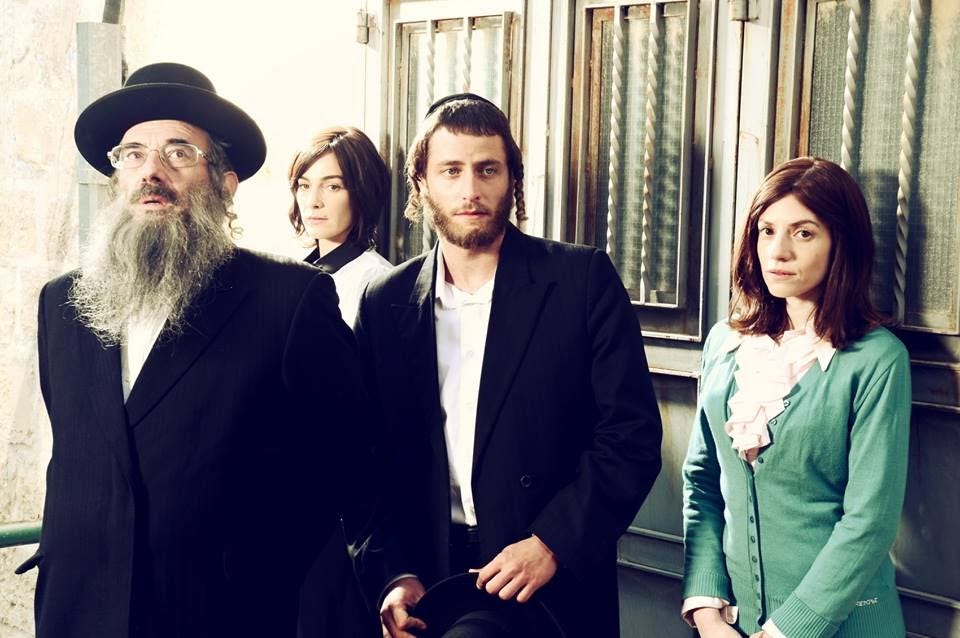Pop Culture Care Package, Pt. 1

Dames Nation, COVID-19 is prompting us to do something different this week: rather than write one big issue, we’re going to produce brief daily issues with a single cultural recommendation each. Tonight’s issue will feature a suggestion from each of us. Tomorrow, Dame Margaret will have something special for you, on Sunday, it’ll be Dame Sophie’s turn, and so on. We hope one nice/interesting/fun/thought-provoking thing daily will be as sustaining for you to read as we know it will be for us to write. We know we write this newsletter weekly for an audience we’ll likely never meet in person, and every week, it’s an exercise in hopefulness. We hope you like the things we recommend, we hope you share them with your friends, we hope our advice is helpful, we hope you discover new things to love and rediscover things you’d forgotten you loved before, we hope you laugh and cry with us, we hope you’re okay, we hope you find ways to help your community be okay, we hope you keep on keeping on, and we hope to play some tiny role in your continued well-being. Keep your heads up.
Dame Margaret’s Rec is a Trio+ of Terrific and Thematically Linked Podcast Episodes

A weirdly apt gif for these episodes
If you are as online as Dames Sophie and I— and maybe even if you aren’t— you may have heard that the most recent episode of Reply All— featuring a man on the hunt for a 90s hit that seems to have vanished from history— is transcendently good. And this praise, flagrant as it may seem, is entirely earned! This episode is extremely good. If you have not listened to it yet, you should listen to it immediately. And then, once it’s done, chase it with these two, equally wild, equally emotional, equally complex podcast episodes also about one-hit wonders from the 1990s:
First, we have 99 Percent Invisible’s episode seeking to answer the question: whomst among us let the dogs out?It turns out that the origin of The Baha Men’s classic jock jam is vastly more byzantine— and interesting— than you might ever guess.
And second, there’s Song Exploder’s recent episode on the making of Semisonic’s indelible 90s hit, “Closing Time”. Warning, though: after listening to this episode, you may spontaneously burst into tears every time you hear “Closing Time”. It will be worth it, but it’s still a risk to think through before leaping.
And, if all that is not enough for you, and you liked Susan Rogers, the producer/music-focused neuroscientist who pops up halfway through the Reply All episode that lead off this podcast daisy chain, you are going to want to hear all about her profound relationship with Prince, detailed in this episode of the (wonderful) This Is Love podcast.
I know podcast time may be down in your life with commutes out, but these four episodes are the perfect bite-sized headphone vacations (20-60 minutes) from all the quarantined people presumably underfoot at present. Enjoy and please do @ me with your thoughts.
Dame Sophie’s Rec is A Leisurely Paced Yet Deeply Engrossing Family Drama

The Shtisel Family considers various emotionally complex endeavors
Around this time last year, I was hollering in DamesPal Kathryn’s DMs daily about the Israeli family drama Shtisel (here’s a trailer). There are two 13-episode seasons streaming on Netflix and I remain obsessed with it. Thank goodness, a third season is set to be filmed this year. It’s about a bunch of things that I love to think about in general and that I think are particularly apt for this moment where we’re going to be in close quarters with some of our loved ones and horribly distant from others. The A-plots typically revolve around the attempts Yeshiva teacher/dreamy painter Avika Shtisel keeps making to get married, but there are also super-engrossing stories about his siblings and the small, intense dramas of their lives, all of which jostle for space under the thematic umbrella of How Do We Find Or Create Space For Our Idiosyncratic Selves In A Community That Demands Extreme Conformity?
Everyone in the Shtisel family’s community is constantly up in each others’ business. It’s almost impossible for any of them to have privacy of any kind, and yet they’re all keeping all sorts of secrets from each other, tip-toeing towards intimacy and then running away from it like so many sandpipers at the ocean’s edge. This is a rich strain of thematic catnip for me, and perhaps it will be for you, too!
The New York Times ran a piece about Shtisel last year, and while I’m glad to see mainstream American coverage of the show, I’m not thrilled with this piece in particular. (As I revised this segment from a subscriber-only issue last winter, I found that the Los Angeles Times subsequently published a much better piece.) In describing quite a few episodes & characters, the Times author badly misreads it more than once. For example, Akiva’s older sister Giti’s husband doesn’t go on a “business trip”, he’s dispatched to work in a kosher slaughterhouse in Argentina because there aren’t enough jobs in Israel for an ultra-Orthodox man ill-suited to being a full-time scholar. Patriarch Shulem could have kept his daughter’s family together by helping to stake Giti’s husband in a technology shop his friends are launching, but...he didn’t, which precipitates months of misery for his daughter and grandchildren. Speaking of Shulem, he’s a pissy, mercurial, manipulative, faux-humble, selfish, and frequently, disastrously wrong-headed person, the Livia Soprano and Logan Roy of the show, whose awfulness is rivaled only by his even worse brother Nachum. A huge part of the show’s appeal is grounded in their children’s attempts to circumvent their fathers’ wishes while figuring out how to do the right thing. Thinking about Shtisel’s frequent emotional claustrophobia, and its depiction of a monstrous patriarch, it occurs to me that it’s a great companion to Succession.
Meanwhile, the women on the show are MVPs, every last one. I want to read an in-conversation interview piece with the actors who play long-suffering Giti, and her brilliant, totally fed-up to here teen daughter Ruchami, along with Akiva’s exceedingly chaste love interests, widow Elisheva and first cousin Libbi (a plot point in Ramy’s first season that I hope is explored in more depth in Season 2). I particularly want to know what Season 2 Ruchami thinks about Season 1’s Ruchami. They’re the same person, but worlds apart: Season 1 Ruchami, with the aid of a helpful school librarian, loves to read banned books like Middlemarch and Anna Kerenina, while Season 2 Ruchami is coming apart at the seams and plunges herself into an impulse marriage to a boy who forces himself to stay awake to study by eating powdered coffee and plunging his feet into a bucket of ice water.
Two seasons of Shtisel are streaming on Netflix. If you watch, I welcome your tweets, emails, telegrams, and urgent semaphore code messages about it!
Two Bossy Dames is brought to you by:
Niall Horan’s delicious new album, Heartbreak Weather!
Niall’s fellow Very Good Music Boy Harry Styles being interviewed on NPR about his love of the Green Bay Packers!
We appreciate you, readers of Dames Nation!
Every time you tell a friend to subscribe, some woman, somewhere, receives a box of homemade hamantaschen from a distant friend right before entering self-imposed semi-quarantine.
Help us build Dames Nation by upgrading to a paid subscription on Substack
Share your saucy opinions with us on Twitter whether jointly as your @twobossydames, or in single size servings as@MrsFridayNext&@sophiebiblio!


